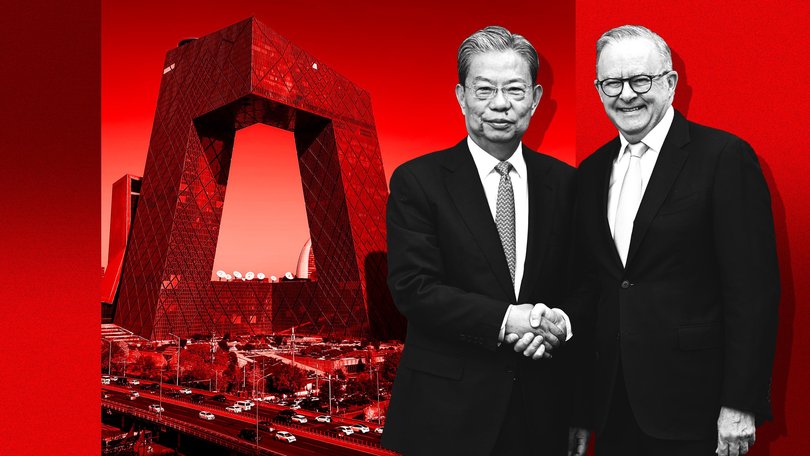Zhao Leji’s Australia visit: A dictator’s henchman receives a warm welcome in Canberra
AARON PATRICK: China’s third-ranked political leader, Zhao Leji, helped oversee a vast purge of officials designed to entrench Xi Jinping’s power.

Zhao Leji, the Chinese political leader feted in Canberra today, last year oversaw the introduction of a law that makes it even more dangerous for foreign companies to operate in China.
Mr Zhao, as the Chinese parliament’s chairman, expanded the scope of corporate information that must be kept confidential and introduced travel restrictions on workers in sensitive industries. The law gave the government more power to harass foreign corporations trying to hire Chinese citizens and understand the structure of Chinese markets.
This week Mr Zhao flew on a Chinese-government 747 jet into Brisbane and Canberra, where he was greeted like royalty by groups of Chinese-Australians. One said she was “very excited” at the arrival of the dour 67-year-old Communist bureaucrat.
Sign up to The Nightly's newsletters.
Get the first look at the digital newspaper, curated daily stories and breaking headlines delivered to your inbox.
By continuing you agree to our Terms and Privacy Policy.The adulation followed him to Parliament House Tuesday morning, when China’s third-ranked politician was allowed to shake hands with Anthony Albanese without being subjected to journalists’ questions.
A senior figure such as Mr Zhao doesn’t travel far without a reason. Yet neither the Chinese embassy or the Prime Minister’s office disclosed details of their conversation.
When he was elected, one of Mr Albanese’s priorities was to improve Australia’s relationship with China. He succeeded. Beijing has ended trade sanctions and ministerial visits have resumed.
The cost of the rapprochement is friendly meetings with enforcers such as Mr Zhao.
Before his current role, Mr Zhao ran the Central Commission for Discipline Inspection. Also known as Xi Jinping’s anti-corruption agency, the commission sowed terror across the government, rooting out wrong-doing on behalf of Mr Xi, the most powerful and feared Chinese leader since Mao Zedong died in 1976.
No doubt many of the Communist officials imprisoned for life or executed were corrupt. But the purges were a way for Mr Xi to replace most of the politburo and enhance his power from the senior member of a seven-man collective to someone who looks not dissimilar to a dictator.
One of those removed was a provincial head named Sun Zhengcai, who was elected as the youngest member of the politburo in 2012 at age 49. Sun’s promotion led to speculation he was heading to the top of the Chinese Communist Party. There was even talk he might succeed Mr Xi.
When Sun was removed from office in 2017 for inadequate “clearing of toxic residue”, Mr Zhao was in charge of the party’s personnel department, an enormously powerful job in a one-party state.
Mr Zhao was present at the meeting where Sun’s removal and replacement was announced, according to contemporaneous media reports, and headed the discipline agency the following year when he was convicted of bribery and sentenced to life imprisonment.
Sun was merely one example of a purge so vast it is hard for outsiders to comprehend. Since Mr Xi began the campaign in 2013, more than 5.7 million party members have been disciplined and almost 470,000 convicted, according to the China Research Centre, a US think tank.
The campaign continues at the rate of about half a million targets a year, ostensibly heading towards a state of illusive ethical purity.
“Despite all its sound and fury, Mr Xi’s crackdown has apparently failed to yield a Marxist ‘come to Jesus’ epiphany that would call China’s corrupt functionaries back to the straight and narrow,” China Research Centre researcher Andrew Wedeman wrote this year.
Every country has power struggles. But political leaders who imprison rivals or potential rivals need to be treated particularly warily, especially when they control huge military forces and support wars against peaceful democracies.
As Mr Zhao arrived at Parliament House, there was opposition. The Falun Gong movement, which has been banned in China since 1999, staged a silent protest opposite the celebratory welcome given by members of Australia’s Chinese community.
Falun Gong members, who have have been imprisoned in Chinese labour camps for their opposition to the regime, reported being harassed on the Parliament House lawns.
Parliament House workers were advised to take steps to protect electronic devices from hacking by Mr Zhao’s entourage, which presumably contained members of the Ministry of State Security.
Mr Albanese’s willingness to please Chinese leaders is effective politics. Australia’s Chinese-born population is around 700,000, making it the third-largest immigrant community -- and an important political constituency that has decisively sided with the Labor Party.
Chinese propaganda is so effective and overwhelming it must be difficult to grow up in China and not believe in the Communist Party’s benevolence. The reality, unfortunately, is different.
Apart from the vast repression of the Chinese people, politicians like Mr Zhao make it harder for Australia to do business in China. Rather than celebrated, he should be scrutinised.

